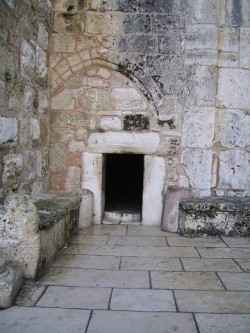 She gave birth to a Son and laid him in a Manger
She gave birth to a Son and laid him in a Manger
‘The shepherds said one to another, Let us now go even unto Bethlehem, and see this thing which is come to pass, which the Lord hath made known to us.’ Let us too go with them, to contemplate that second and greater miracle to which the Angel directed them, the Nativity of Christ. St. Luke says of the Blessed Virgin, ‘She brought forth her first-born Son, and wrapped Him in swaddling clothes, and laid Him in a manger.’ What a wonderful sign is this to all the world, and therefore the Angel repeated it to the shepherds: ‘Ye shall find the babe wrapped in swaddling clothes, lying in a manger.’ The God in heaven and earth, the Divine Word, who had been in glory with the Eternal Father from the beginning, He was at this time born into this world of sin as a little infant. He, as at this time, lay in His mother’s arms, to all appearance helpless and powerless, and was wrapped by Mary in an infant’s bands, and laid to sleep in a manger. The Son of God Most High, who created the worlds, became flesh, though remaining what He was before. He became flesh as truly as if He had ceased to be what He was, and had actually been changed into flesh. He submitted to be the offspring of Mary, to be taken up in the hands of a mortal, to have a mother’s eye fixed upon Him, and to be cherished at a mother’s bosom. A daughter of man became the Mother of God – to her, indeed, an unspeakable gift of grace; but in Him what condescension! What an emptying of His glory to become man! and not only a helpless infant, though that were humiliation enough, but to inherit all the infirmities and imperfections of our nature which were possible to a sinless soul. What were His thoughts, if we may venture to use such language or admit such a reflection concerning the Infinite, when human feelings, human sorrows, human wants, first became His? What a mystery is there from first to last in the Son of God becoming man! Yet in proportion to the mystery is the grace and mercy of it; and as is the grace, so is the greatness of the fruit of it.
Extract from the sermon: Religious Joy, PPS VIII, 17, 25th December 1825
